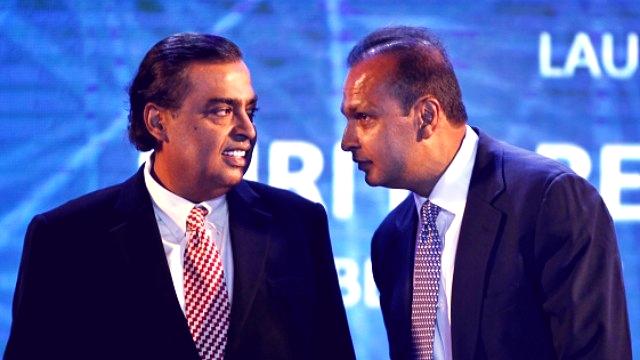Can you believe that an Ambani company would be going bankrupt one day? The late Dhirubhai Ambani led Reliance group, which used to symbolize the Indian growth story has gone bankrupt. Reliance group is headed by Dhirubhai Ambani’s younger son Anil Ambani. Three petitions were filed by Swedish telecom giant Ericsson against Reliance Communications and its subsidiaries in National Company Law Tribunal which accepted the petitions and ordered bankruptcy proceedings against Reliance Communications, although both later agreed to resolve the issue outside of court. In a press release, Reliance Communications confirmed the development to the BSE and said, “We confirm that RCom and Ericsson are at an advanced stage of discussions to expeditiously resolve commercial issues. This will enable Reliance Communications to exit the NCLT process. RCom is confident to expeditiously proceed with its monetization plan with Reliance Jio and overall Resolution Plan with the lenders, keeping in mind the interests of all stakeholders.” The shares of Reliance rose exponentially on the news of resolution of issues outside of court.
Reliance Communications was started in 2002 as telecommunication arm of the Reliance Industries. The company had initial success as there was an untapped market base but slowly the fortunes of the company began to slip. Dhirubhai Ambani died in 2002 and the brothers split the family business in 2006. Mukesh Ambani got Reliance Industries Limited (RIL) and Indian Petrochemicals Corporation Ltd (IPCL), while Anil Ambani ended up with the responsibility for Reliance Infocomm, Reliance Energy, and Reliance Capital.
In 2007, a few months after splitting the family business, Anil Ambani had a net worth of $45 billion according to the Forbes Richest List. His biggest asset was a 66% stake in telecom venture Reliance Communications. Elder brother Mukesh had a net worth of $49 billion. In the 2017 Forbes Rich List, Anil’s net worth had shrunk to just $3.15 billion while Mukesh’s was $38 billion. In the period of one decade, while the elder brother has expanded his empire throughout the country, the younger brother could not handle family fortunes and shrunk to the bottom line. The group of companies reflected this trend as well. The 10-year compounded annual growth rates (CAGRs) of Mukesh’s Reliance Industries have been 11.2 (sales), 9.4% (profit) and 17.8% (returns), according to a Bloomberg report. The same rates for Anil’s Reliance Group have been 9.4%, -12.6% and -1.7%.
The gap in the market value of both the groups too has widened since 2006. The market capitalization of Reliance Industries rose six times to nearly Rs 6 lakh crore, while the combined market value of Anil’s firms—Reliance Capital, Reliance Infrastructure, and Reliance Communications—declined about 17% to 47,017 crores.
The gap in the valuation of Anil and Mukesh led groups could be attributed to the stark contrast in their managerial style. It isn’t just a case study but a life lesson for all aspiring businessmen.
The Managerial style of both brothers is very different. The leadership style of Mukesh Ambani epitomizes the traditional Indian style running a Hindu undivided family business. He involves himself in every large-scale project, and is known for his ability to visualize, conceive and implement mega projects down to the last screw and nail. He has planned and overseen some of the country’s grand projects, including the Rs 15,000 crore Reliance Petroleum plant in Jamnagar, the single biggest investment in post-liberalization India. He is a 24*7 businessmen with a low profile, and workaholic persona; he hardly interacts with media except on company’s annual day functions. He is known to work for monopoly in the markets, similar to his father. In the early days of the business his father monopolized thread-making business, and now he is himself doing the same in the telecommunication market. Since his company entered the market with a 1GB free data and unlimited free calling package throughout India, the prices of calling and data services have crashed. He was being compared to the freebie distributing Chief Ministers of Tamil Nadu but he was doing it with his own money, not the taxpayers’ money. Within a short period of a year, his company captured almost 20 percent of the telecommunications market. His style of doing business is same in other markets too. Friends and rivals use two words to describe Mukesh: obsessive and ruthless. Of late, another description has been floated: control freak, but of the positive kind.
Anil, on the other hand, is more like a western businessman. He is flashy, flamboyant, urbane, high-profile and accessible, he is dear to media as he regularly throws lavish parties for them. While his brother is known for keeping a safe distance from politicians at least in public eye, Anil is close to politicians like Mulayam Singh Yadav and Amar Singh, he also got a seat in Rajya Sabha from which he later resigned. He has pioneered many innovations in the Indian capital markets and has had unparalleled success in raising capital from global markets for Reliance. He knows the world’s biggest international financiers by their first names and is the telegenic face of the company. He is known for trusting his managers and going with their opinions rather than involving himself in any project in great detail.
When Anil Ambani’s companies started making losses, he started summing up his business and planned to sell operations of Reliance communication to his elder brother Mukesh Ambani, but the deal could not capitalize because Swedish telecom giant Ericsson objected to the transaction. The latest news in media is that both are reconciling again. Whatever be the future of the business, Anil Ambani will be go down as a person who could not handle family fortunes.




























